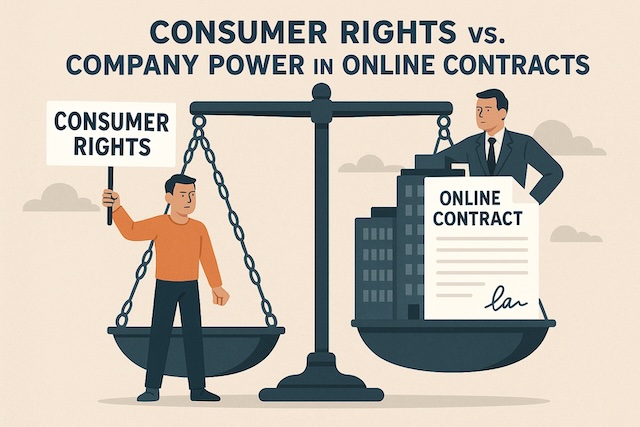We earn commissions when you shop through the links below
Online Terms of Service (ToS) epitomize contracts of adhesion: non-negotiable, standardized agreements imposed by businesses on consumers. Courts traditionally enforce adhesion contracts, but they scrutinize them for unconscionability, public policy concerns, and statutory protections. This post examines the doctrinal tension between consumer rights and corporate power.

1. Adhesion Contracts and the Duty to Read
Courts presume that parties are bound by contracts they accept, even without reading them.
- Hill v. Gateway 2000, Inc., 105 F.3d 1147 (7th Cir. 1997) — enforced “shrinkwrap” terms included in a shipped computer, reasoning that failure to read does not void assent.
Implication: Consumers rarely succeed by arguing ignorance of terms; the focus shifts to whether terms are substantively unfair.
2. Unconscionability Doctrine
Courts use unconscionability as the principal tool to police unfair ToS provisions.
- Procedural unconscionability: lack of meaningful choice (e.g., adhesion format, hidden terms).
- Substantive unconscionability: terms unreasonably favor the drafter (e.g., excessive fees, unilateral rights).
Sliding Scale: Courts typically require some degree of both.
- Williams v. Walker-Thomas Furniture Co., 350 F.2d 445 (D.C. Cir. 1965) — landmark case recognizing unconscionability as grounds to invalidate oppressive terms.
- Armendariz v. Foundation Health Psychcare Services, Inc., 24 Cal. 4th 83 (2000) — struck down arbitration agreements lacking mutuality and adequate remedies.
3. Arbitration and Class Action Waivers
Arbitration clauses in ToS have dramatically curtailed consumer remedies.
- AT&T Mobility LLC v. Concepcion, 563 U.S. 333 (2011) — upheld class arbitration waivers, preempting state laws that prohibited them.
- Epic Systems Corp. v. Lewis, 138 S. Ct. 1612 (2018) — reaffirmed the enforceability of arbitration agreements, even when they waive collective litigation rights.
Result: Consumers are often restricted to individual arbitration, limiting the deterrent effect of class actions.
4. Public Policy Limitations
Certain contractual provisions are unenforceable as a matter of public policy, even with assent.
- Henningsen v. Bloomfield Motors, Inc., 32 N.J. 358 (1960) — invalidated warranty disclaimers that left consumers without meaningful remedies.
- Courts frequently strike clauses that attempt to waive liability for intentional torts, statutory rights (e.g., under consumer protection laws), or gross negligence.
5. Statutory and Regulatory Safeguards
Legislation increasingly supplements judicial review of online contracts:
- Federal Trade Commission Act (FTC Act): prohibits unfair or deceptive practices in ToS.
- GDPR (EU) / CCPA (California): override contractual provisions that attempt to circumvent statutory data rights.
- State “Unfair and Deceptive Acts and Practices” (UDAP) statutes: provide remedies where ToS terms overreach.
6. The Emerging Balance
Courts walk a fine line between respecting freedom of contract and protecting consumers from overreach. The general trajectory:
- Strong enforcement of assent (even if terms are unread).
- Heightened scrutiny of substantive fairness in adhesion contracts.
- Deference to arbitration under the FAA, often limiting consumer collective remedies.
Key Takeaways
- Consumers are generally bound by online terms, but unconscionability and public policy provide limited safeguards.
- Arbitration clauses have shifted power toward companies, significantly reducing consumer access to collective litigation.
- Statutory regimes increasingly supplement contract law, particularly in areas of data protection and deceptive practices.
In the next post, we’ll examine Privacy Policies and Data Rights, focusing on how contract law interacts with modern regulatory frameworks such as GDPR and CCPA.





